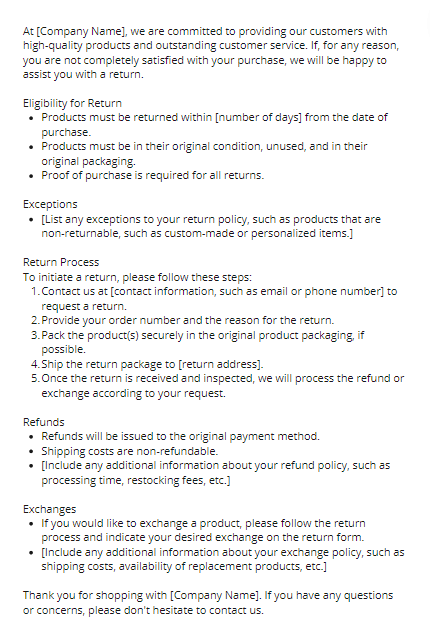As a business owner in the Philippines, it’s important to have a well-defined return policy in place to handle customer returns and exchanges.
Studies show that the average eCommerce return rate is between 20-30%. And a clear and effective return policy can help build trust with your customers, improve customer satisfaction, and reduce the risk of disputes.
In this blog post, we will explore the key elements of an effective return policy and provide tips for how to implement one for your business in the Philippines.
What is a Return Policy?
A return policy is a set of rules and guidelines that a business owner establishes to govern the process of accepting and processing returns and exchanges of their products or services.
It outlines the conditions under which customers can return or exchange purchased items, the steps they need to follow to initiate a return, and the timeframe within which returns will be accepted.
A return policy is an important aspect of customer service, as it sets expectations for customers and helps resolve disputes or misunderstandings that may arise during a return or exchange.
It also builds trust in your eCommerce website and overall business operations.
Benefits of a Return Policy in the Philippines
A return policy is required in the Philippines under RA 7394, popularly known as the Consumer Act of the Philippines.
The law states that customers have the right to compensation if they receive goods that are either faulty or not as described. They have the option of returning the item, asking for a replacement, a refund, or a repair.
More than that, a study published in Science Direct reveals that having a return policy may actually increase sales more than the number of returns.
Therefore, having a clear and effective return policy in place can bring a number of benefits to your business in the Philippines.
- Improved customer satisfaction. By clearly outlining the process for returns and exchanges, customers are more likely to feel confident in their purchases and have a positive experience with your business.
- Reduced risk of disputes. A clear and transparent return policy helps to reduce the risk of disputes with customers, as it sets clear expectations for the process of handling returns. By following your policy consistently, you can avoid misunderstandings and disputes, and resolve any issues quickly and efficiently.
- Increased customer loyalty. Customers appreciate businesses that are transparent and fair in their dealings, and a well-defined return policy can help establish this perception. This will also likely increase your customer retention rate.
- Better tracking and management of returns. By establishing a clear process for handling returns, you can ensure that returns are tracked and managed more efficiently, reducing the risk of lost or damaged merchandise and accelerating and improving your returns process.
- Improved operational efficiency. An effective return policy can help streamline your operations, as it eliminates the need for ad-hoc decision-making and reduces the risk of confusion or misunderstandings.
Crafting a Return Policy
Crafting a return policy requires careful consideration of your business goals, the needs of your customers, and the regulations that apply in the Philippines.
Make sure your customers receive excellent service from beginning to end. Start by making sure they are aware of your policies, and finish by fulfilling your promise to them.
Before you start crafting your return policy, it’s important to determine your goals and consider what you want to achieve.
Answering these questions will help you establish the underlying principles of your return policy:
- Do you want to minimize the risk of returns, or are you more focused on maximizing customer satisfaction?
- Are there certain products or services that you want to exclude from your policy?
- What is the typical process for returning products in your industry, and what do your competitors offer in terms of return policies?
Think about the types of products or services you offer and the reasons why customers may need to return them. Understanding the needs of your customers will help you create a policy that meets their expectations and builds trust in your business.
However, in the Philippines, there are several consumer protection regulations that you need to also consider when crafting your return policy.
One great example is the Consumer Act of the Philippines, which requires businesses to provide clear and concise information about their return policies to customers.
It’s important to familiarize yourself with these regulations and ensure that your return policy complies with the law.

Once you’ve oriented yourself to the different eCommerce laws in the country, you can now start outlining the terms and conditions of your return policy.
You may specify a time limit for returns, or require that products be returned in their original packaging. Just make sure that your conditions are reasonable and in line with industry standards.
Also, your return policy should outline the steps that customers need to follow to initiate a return, including how to initiate a return, what information is required, and how the return will be processed.
Specify the timeframe within which returns will be accepted.
You can also consider offering free returns. This helps increase customer satisfaction as it eliminates the cost of returning the products.
Here is a return policy template that you can easily customize to match your business needs.
E-Commerce Return Policy Template

Just remember to make the process as simple and straightforward as possible to reduce the risk of confusion or frustration for customers.
And regularly review and update your return policy to ensure that it remains relevant and effective and that you continue to meet the needs of your customers.
Implementing Your Return Policy
Implementing your return policy is an important step in ensuring a smooth and effective return process for your customers. Here are some key steps to help you put your policy into action:
Communicate and Provide Clear Instructions
Make sure that your return policy is clearly communicated to your customers. Provide clear instructions on how to initiate a return, including what information they need to provide, how to package the product, and how to send it back.
By doing this, you will reduce the possibility of misunderstandings and assist customers in setting expectations.
Your return policy can be put anywhere in your online store that’s easy to find:
- FAQ page
- Product page
- Website footer
- Cart
- Checkout
Streamline your process
As much as you can, make sure your return policy is simple and effective.
Provide regular training and support to your staff so they will be familiar with and equipped to handle returns and resolve any issues that may arise.
As a result, there will be less chance of missing or damaged goods, and returns will be handled quickly.
Respond to Customer Inquiries
Be sure to provide timely and personalized customer service when they inquire about returns and exchanges. And that you have a system in place for tracking and resolving customer concerns, including the date, reason for the return, and how the issue was resolved.
This will make it easier for you to keep track of how your return policy is working and find any potential areas for improvement.
FAQs
What is the law for returning goods?
7394, or the Consumer Act of the Philippines. The law simply states that customers have the right to compensation if they receive goods that are either faulty or not as described. They have the option of returning the item, asking for a replacement, a refund, or a repair.
Can a store refuse to give a refund in the Philippines?
The Department of Trade and Industry (DTI) has reiterated that the “No Return, No Exchange” policy is prohibited and is considered a deceptive sales act under the law.
Final Thoughts
Implementing a comprehensive return policy in the Philippines is crucial for enhancing customer trust and loyalty as well as reducing the chances of returns. By taking into account the needs of your customers, adhering to relevant Philippine regulations, and streamlining your return process, you can establish a return policy that aligns with the needs of your online business and your customers.
It’s important to note that a powerful return policy is a cornerstone of a successful business in the Philippines, and investing the time and effort to get it right will bring substantial benefits in the long run.
Feel free to ask any questions you may have in the comments section below if there is anything we missed.
Prosperna, Your Partner to eCommerce Success
Prosperna is an all-in-one eCommerce platform for Philippine businesses. We are on a mission to empower 100,000 Philippine MSMEs with simple and affordable eCommerce solutions.
In fact, we are super passionate about helping Philippine MSMEs we’re giving you a free account forever!
Want to implement an effective return policy for your online store? Create your free-forever Prosperna account now.




